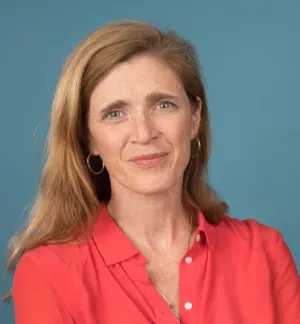
Thank you, Kathy, for your generous introduction, for your leadership at the United Nations Foundation, and for the absolutely critical work the foundation is doing to support the ideals and the mission of the United Nations.
Thank you, Mr. Secretary-General -- you’re somewhere, there you are -- for your invaluable leadership on so many issues: human rights; ‘Rights Up Front,’ which I think will be a signature legacy of yours; climate change; and most recently Ebola, where I think this is the only ten-minute period I’ve seen you not on your cellphone calling a world leader to try to get them to step up with health workers, or beds, or resources to support what is really the most important thing any of us could be doing right now as we face the most dangerous health crisis of the modern age and one we can stop in its tracks.
Good evening, also, to my fellow ambassadors and to Minister Kutesa -- or now Mr. President, President of the General Assembly -- welcome again to New York.
I consider myself most honored to present the distinguished Leo Nevas Award -- Human Rights Award -- tonight to Justice Michael Kirby.
Before I do, let me say a brief word about Rana Abdelhamid, who is receiving tonight’s Youth Advocate Award. Rana is here with us tonight -- Rana, will you please stand? Where is Rana? (Applause) So, stay standing, don’t sit down yet.
Just as Leo Nevas’ lifelong efforts for social justice were sparked by the anti-Semitism he encountered as a young lawyer, so was young Rana’s activism catalyzed by the hostility she experienced as a Muslim American coming of age in post-9/11 New York. The organization she founded is preparing a generation of fellow Muslim women leaders to stand up to violence and repression. Rana, we expect a lifetime of leadership from you. Congratulations. And let’s give Rana another round of applause. (Applause)
Now the career of Justice Kirby, tonight’s awardee, also parallels the principles that Leo Nevas believed in and fought for. Nevas spent his life promoting human rights -- from raising awareness about the plight of Jewish dissidents in the former Soviet Union to co-founding the Hole in the Wall Gang to give children with serious illnesses the chance to have fun at camp. Justice Kirby has also spent his life tackling injustice on a whole series of fronts.
While tonight we are honoring Justice Kirby specifically for his work to promote human rights in North Korea, we also pay tribute to his pioneering efforts to strengthen international human rights jurisprudence; his leadership in the global effort to tackle HIV/AIDS; and his public declaration in 1999 -- while serving on Australia’s highest court -- that he had been in a loving relationship with his same-sex partner for decades. That courageous announcement established him as one of his country’s most eloquent advocates for LGBT rights, a movement he continues to help lead to this day.
Across these campaigns and so many others, what has made Justice Kirby so effective is his ability to bring together an unparalleled intellect with a very human capacity to empathize with the vulnerable. And in no endeavor has this combination been as indispensable as in his leadership of the Commission of Inquiry on Human Rights in the Democratic People’s Republic of Korea. Created in March 2013, the Commission was charged with conducting an in-depth investigation of human rights conditions in North Korea.
Ever the impartial researcher, Justice Kirby started off by seeking permission to enter North Korea to investigate abuses first-hand and to meet with its government. Unsurprisingly, he was denied access. So Justice Kirby sought the next best alternative: he made it a priority to hear directly from North Koreans who had personally experienced the regime’s repression, whether as victims or as perpetrators, as well as from experts. Then he methodically checked their accounts against corroborating evidence.
More than 200 victims, eyewitnesses, and former officials provided confidential evidence to the Commission, and 80 witnesses participated in its public hearings in Seoul, Tokyo, London, and Washington.
For decades, the world had been given only glimpses behind the curtain of North Korea’s horrors. Yet the testimonies shared before the Commission pulled down that curtain. What was revealed was even more disturbing than what we had imagined.
The first witness to publicly speak before the Commission was Shin Dong-hyuk, who had been born into a detention camp. He recounted how, as a small child in the camp, he saw a seven-year-old girl stopped for a random inspection. A guard found a few grains of food in the young girls’ pocket and asked where they came from. When she said she had found them on the ground, the guard said, “That’s not the way I taught you.” Then he beat her with a wooden stick until she was unconscious. That little girl died the next day.
A former guard from another camp named Ahn Myong Chul told the Commission that guards routinely raped prisoners. On one occasion, he said, when superiors learned that a guard had raped an inmate, the victim was taken to a detention house and tortured using fire. Then she was sent to perform punishing labor in a mine -- all for the “crime” of having been raped.
Were the Commission only to have given voice to generations of victims, it would have made an unprecedented contribution to documenting atrocities. But under Justice Kirby’s leadership, the Commission also analyzed similarities across cases, assembling clear evidence that the abuses constitute part of a “systematic, widespread, and grave” pattern of crimes against humanity.
Based on this analysis, the Commission concluded these crimes were driven by “policies established at the highest level of State.” That finding will be essential to eventually holding the perpetrators of these unspeakable crimes accountable.
The findings have also forced North Korea to answer difficult questions about its actions, and have prodded other countries to ask those difficult questions. Who can defend a system in which it’s normal to beat a famished seven-year-old to death for pocketing a few grains of food? What country can partner with a regime that tortures women prisoners for the “crime” of being raped?
The investigation led by Justice Kirby has set a new bar for what the international community should expect from UN bodies, including, but not only, Commissions of Inquiry. From holding public hearings that give voice and dignity to the victims, to establishing clear lines of accountability, to setting out tough recommendations, Justice Kirby’s Commission demonstrates how UN bodies can do more than just compile facts.
When Justice Kirby presented the report to the UN Human Rights Council, he said: “The findings of the Commission are hard to hear, but truthful. Our conclusions are heavy, but inevitable. The recommendations are challenging, but unavoidable.”
Since the report’s release, Justice Kirby has not gone gently into the night. He has been a forceful advocate for the Commission’s recommendations, including that the Security Council refer North Korea’s situation to the International Criminal Court; that the Council adopt targeted sanctions against individuals bearing the greatest responsibility for crimes against humanity; and that neighboring countries stop sending people who escape North Korea back there when they are sure to suffer grave punishment.
Perhaps the clearest evidence of the report’s impact has been the vigorous verbal counter-offensive it seems to have triggered by North Korea. Last month, the regime released its own report on its human rights record -- nearly 54,000 words long -- together with a statement saying that its citizens “feel proud of the world's most advantageous human rights system.”
Last week, North Korea’s representatives circulated a draft resolution at the UN, calling for “the relevant UN human rights mechanisms to make [an] unbiased reassessment of the human rights situation [in] the DPRK,” in view of “the objective facts.” This call was echoed on Monday, this week, by the country’s representative to the UN, in a talk he gave at the Council on Foreign Relations. And earlier today, in a meeting at the UN, the North Korean government attacked the Commission’s report as propaganda of the United States.
The regime’s reaction shows that it is feeling the pressure, and that it cares what the world thinks. Members of the United Nations should take notice. For while governments may argue over the most effective way to stop North Korea’s atrocities, there no longer can be any debate about whether we must shine light on those atrocities. We must shine more light, not less. We must exert more pressure, not less, on its repressive leaders. And it is Justice Kirby who has led the charge to shine that light and exert that pressure.
For revealing the horrors they have endured at the hands of their government, Justice Kirby has done a great service to the North Korean people. And for pressing the international community to stop these atrocities and to bring those responsible to justice, he has made a tremendous contribution to the cause of global justice.
It is now my distinct honor to present the Leo Nevas Award to Justice Michael Kirby.
Thank you.
###
Power, Samantha. “Remarks by Ambassador Samantha Power at the UNA-USA and UN Foundation Global Leadership Dinner.” October 23, 2014


